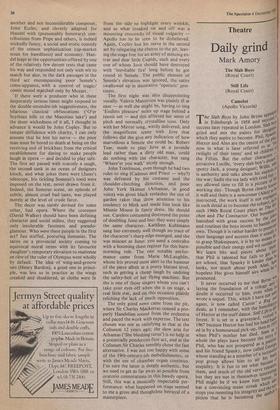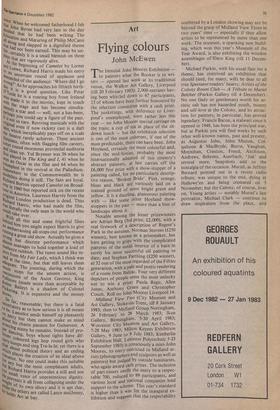Theatre
Daily grind
Mark Amory
The Slab Boys (Royal Court) Still Life (Royal Court) Camelot
(Apollo Victoria) to grasp Shakespeare, it is by no Inear/50-. that Phil is talented but fails to get I be art school, that Spanky is kinder thanto looks, not much about posh Alan, i5 hopeless Hee gives himself airs when Ile chen and The Contractor. Our boredn'"ice and routines the boys invent to banish ale own. Though it is rather harder to ii their language and accents than it asn' )0.1, possible and their energy and wit sustabler; We learn bits and pieces about th.00 attractive Lucille, 'every slab boy's dret5IC are allowed time to fill in a picture 01 0.5 working day. Though Byrne clearly Icricbe such 1960s Royal Court plays as Tile.„•0 banished with great success by the jtf)beir The Slab Boys by John Bryne aPPedi- success later repeated in London. Slab u:s' grind and mix the paints for desigf.ky' which they aspire to become. Phil, S101','„". Hector and Alan are the centre of the P7111'. now in what is later referred to as ''of twilight of their teens' and so children the Fifties. But the other characters:. spotty Jack, a young designer; Willie, is authority and talks about his exP10": the war; Sadie the tea lady with tired fee;t; it well and there is a newcomer (Alan), 1,;(ined instructed, the work itself is not exP'sjil in such detail as to become the subject, aki.
in Edinburgh in 1958 and eni°Yno
0(4 promoted.
It never occurred to me that BYtto I laying the foundation of a trilogY doubt it occurred to him, even whe'aeo wrote a sequel. This, which I have Ot 'and again, is now called Cuttin' a gittoo deals, as I remember, with the hurfluTdif• of Hector at the staff dance. Still Life `sditi ferent. It is set in a graveyard, vis,iteholr 1967 because Hector has had his head "of, ed in by a homosexual pick-up, then ill as 3 when Phil's mother has died. Seen whole the plays have become the std!Yter, Phil, who has not prospered as a Pt,inige. and his friend Spanky, now called Gus'sfal whose standing as a member of a sueeebsasic pop group allows him to air his me of stupidity. It is fun to see what beca''ajes. but they are not in themselves interes renitifig, iie them, and much of the old verve Phil might be if we knew him bet tero has a convincing mean streak which11,505' stops you resenting his integrity and picion that he is becoming the all t",whor 5
'
tvhniec. When he welcomed fatherhood I felt d'at.el John Byrne had very late in the day Eedect that he had been writing The aiducation and Maturing of Philip McCann till 4°118 and slapped in a dignified theme
had not been earned. This may be un- certainly it is a small blemish on three maYs that are vigorously alive.
At the
beginning of Camelot by Lerner
L°e‘ve, Richard Harris made his entry dt an uncertain round of applause and wenianded of the audience: 'Where did I go dr°11g?' As he approaches his fiftieth birth- 01001 it is a good question. Like Peter 1001e he is a roaring boy from Ireland with Made it in the movies, kept in touch ilLs" the stage and has become simulta- p-uusly a star and — well, not a has-been, Iter.haPs you could say a figure of the past. 0 !s.not so rare. Reviving musicals with the icrile8,11141 even if now rickety cast is a daft th;ich inexplicably pays off on a scale ineatre rarely achieves. These ancient i,uespltter ans, often with flagging film careers, aflcl ,round enormous provincial auditoria si -,ean Yul Brynner was 36 when he tritPlaYed in The King and 1, 41 when he an Oscar in the film and 64 when he S0:43ned in the revival at the Palladium.. 0,,"'ewhere in the Commonwealth he is kvitibtless doing it still. The fans are loyal. way d Burton opened Camelot on Broad- toat;',.I.11 1960 but reported sick on the recent eri-.In America. Laurence Harvey from the London production is dead. Thus was-"Ird Harris, who had made the film, -,i'iterallY the only man in the world who tWake over. hocith all this and some frightful films O il eind hnn You might expect Harris to give Mbarrassing all-stops-out performance .Luhi strn ng a great old show. Actually he gives a "118 but discrete performance which ril-`2.st manages to hold together a load of jeet-ml°cre rubbish. The tunes sound like re- sacis from My Fair Lady, which I think was atom the time, but that still leaves them 014-isivate. The jousting, during which the ten:. st0Ps for the unseen action,. is Ile-niscent of the Ascot Gavotte, King krth.lin,,°re (made more than acceptable by Pick' Bailey) is a shadow of Colonel shawesr.14. It is expensive and the money ltase.o far, reasonable; but there is a fatal to b.rtaintY as to how serious it is all meant Oa e' as sends himself up pleasantly ab entry but then cannot make us mind Drnati his chaste passion for Guinevere. A erandcamitinnirmy he remains. Instead of pro- ferent boys whose tights have dif- earif- ear coloured legs hop round girls who chat hooPs and sing Tra-la-la; yet there 1s a ikili`Lahout political theory and an ending reme'l Places the creation of an ideal above ror-an ace. No one could make this suitable btitn:Y but the most complaisant adults, too ‘:lehard Harris provides a still and not He :Mall voice of unpretentious dignity. tve(kreverns it all from collapsing under the %flit of its own idiocy and it is apt that, he-he the others are called Lance andJenny, "01ds Art at bay.











































 Previous page
Previous page